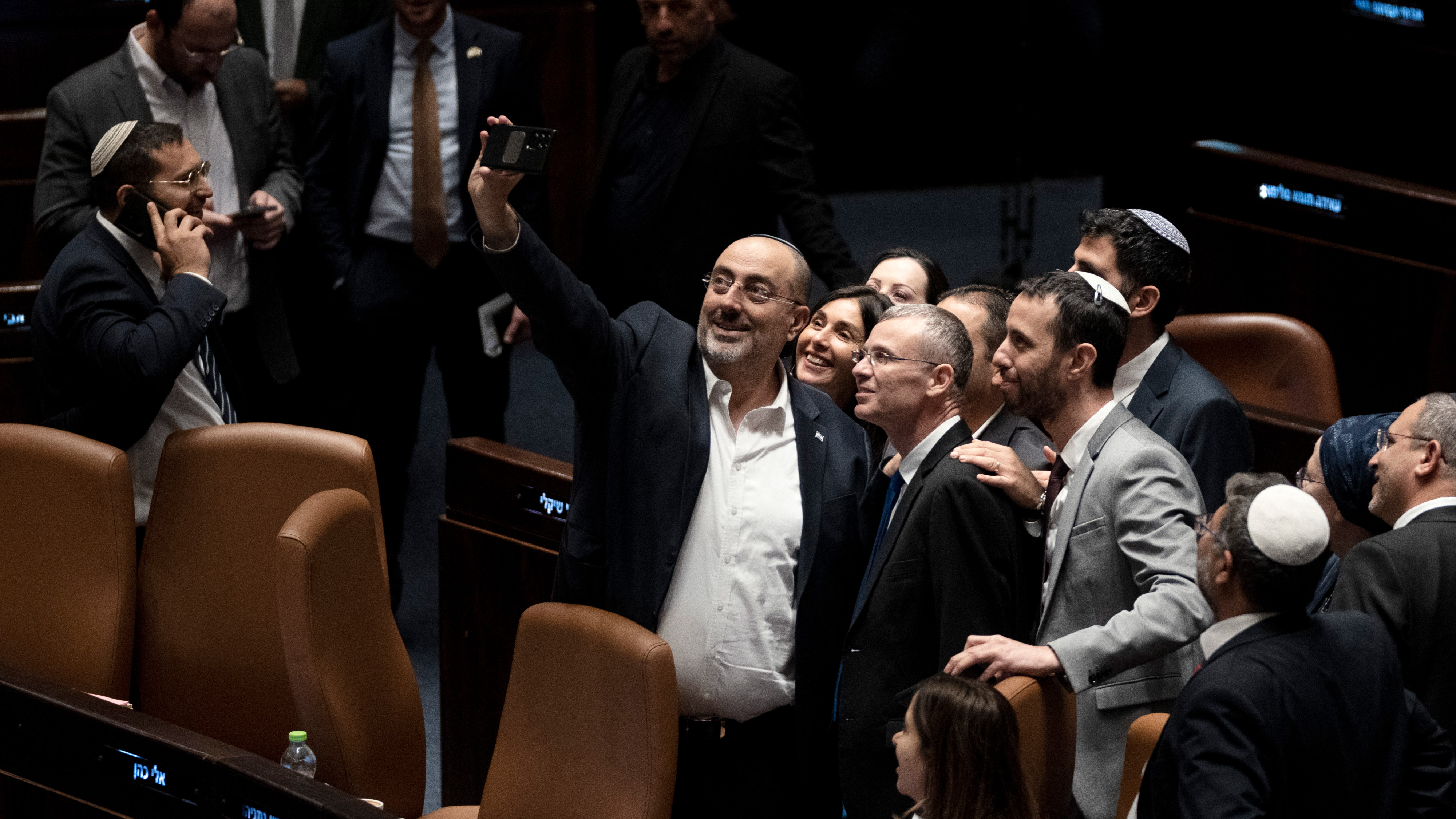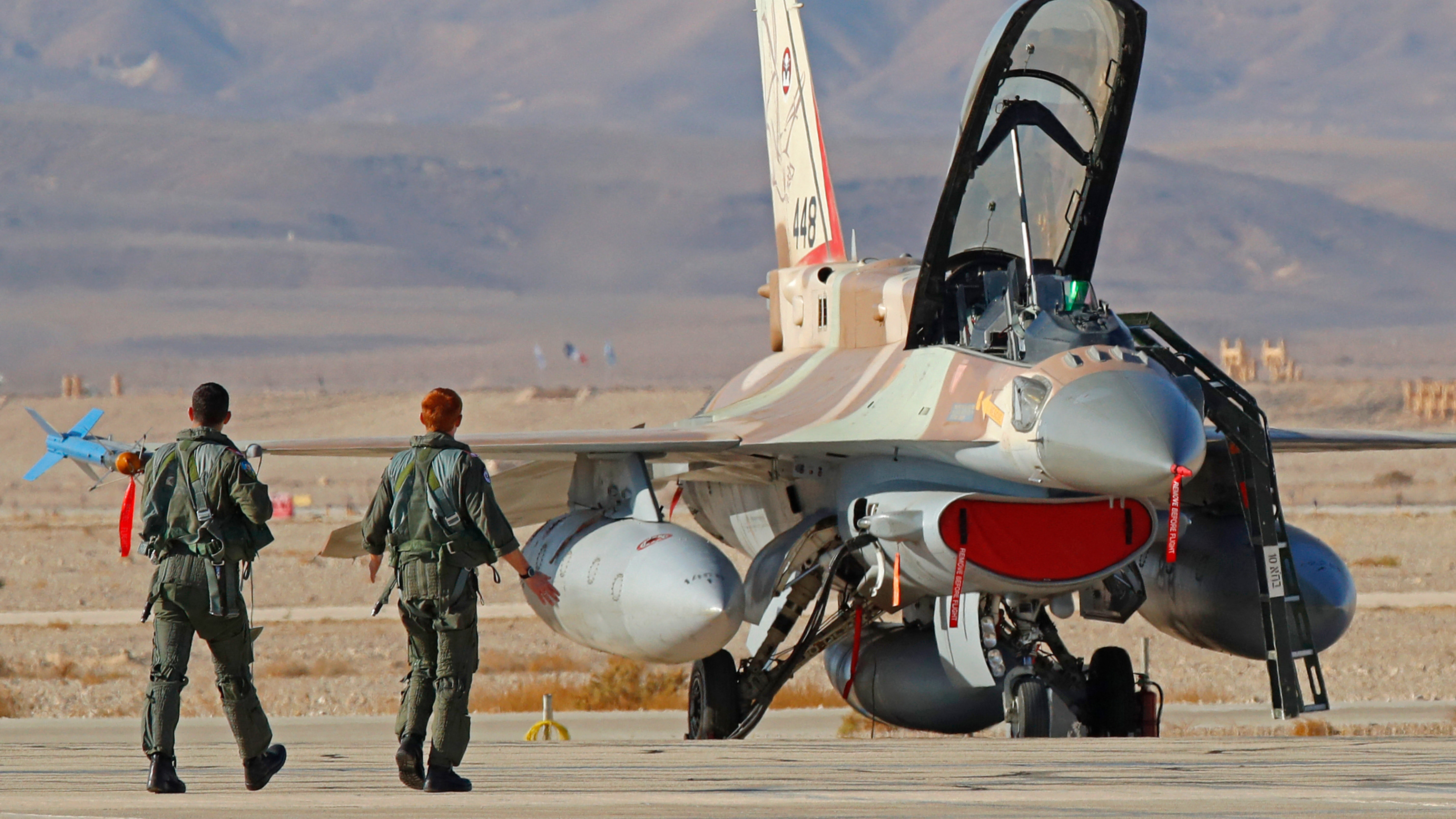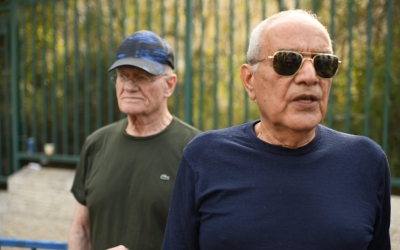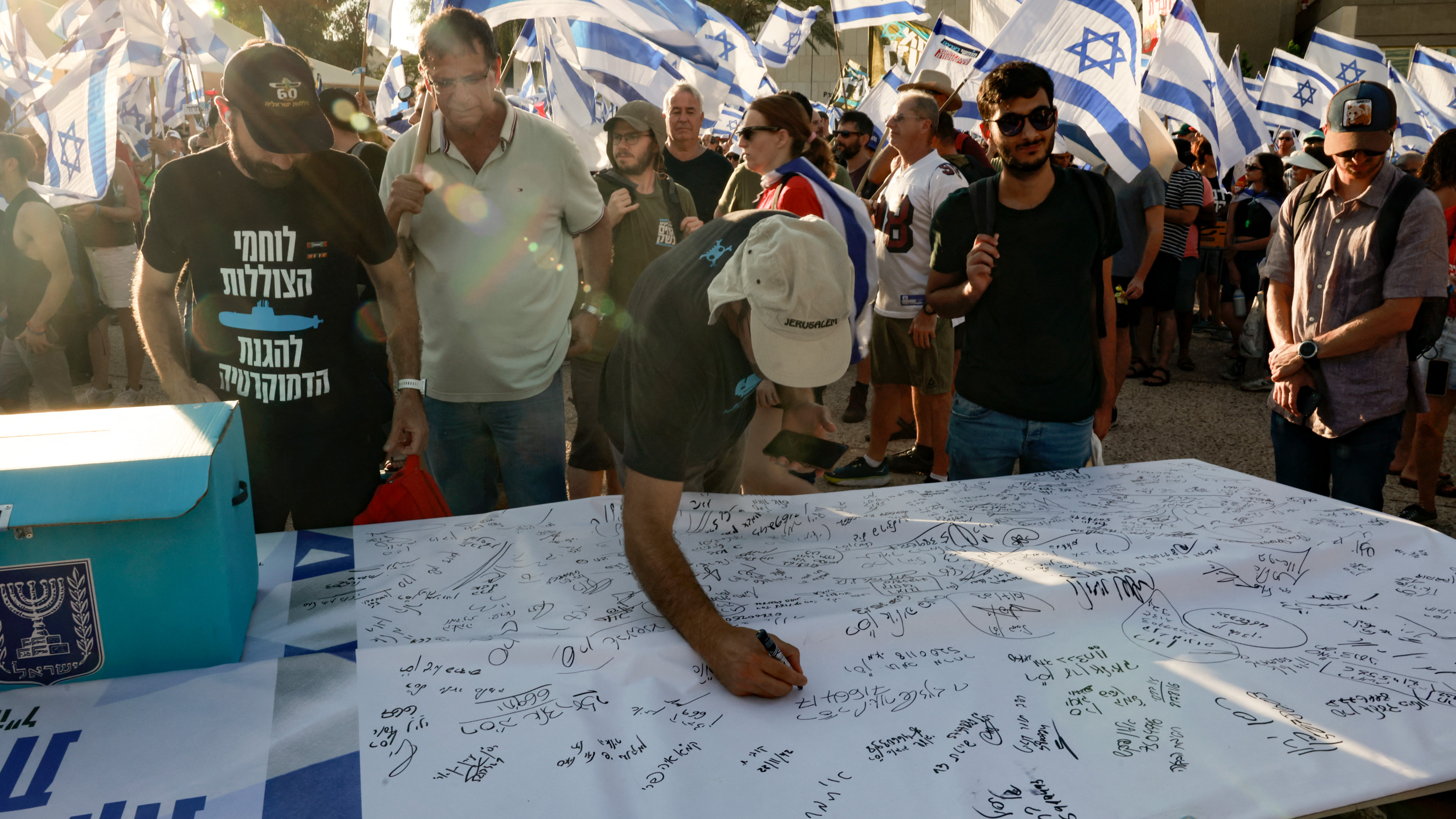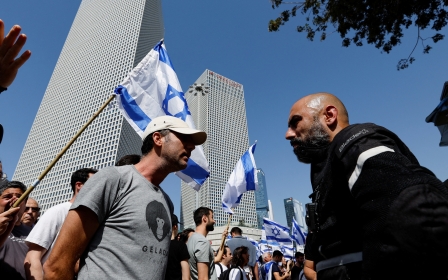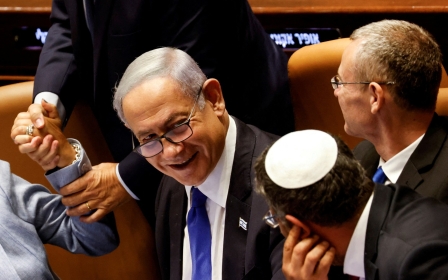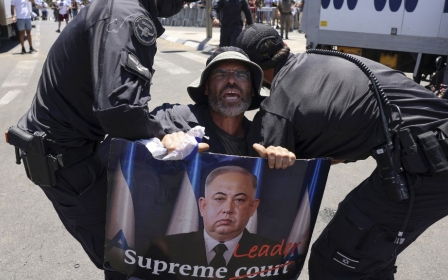Israel judicial crisis: The unprecedented cracks emerging in the army
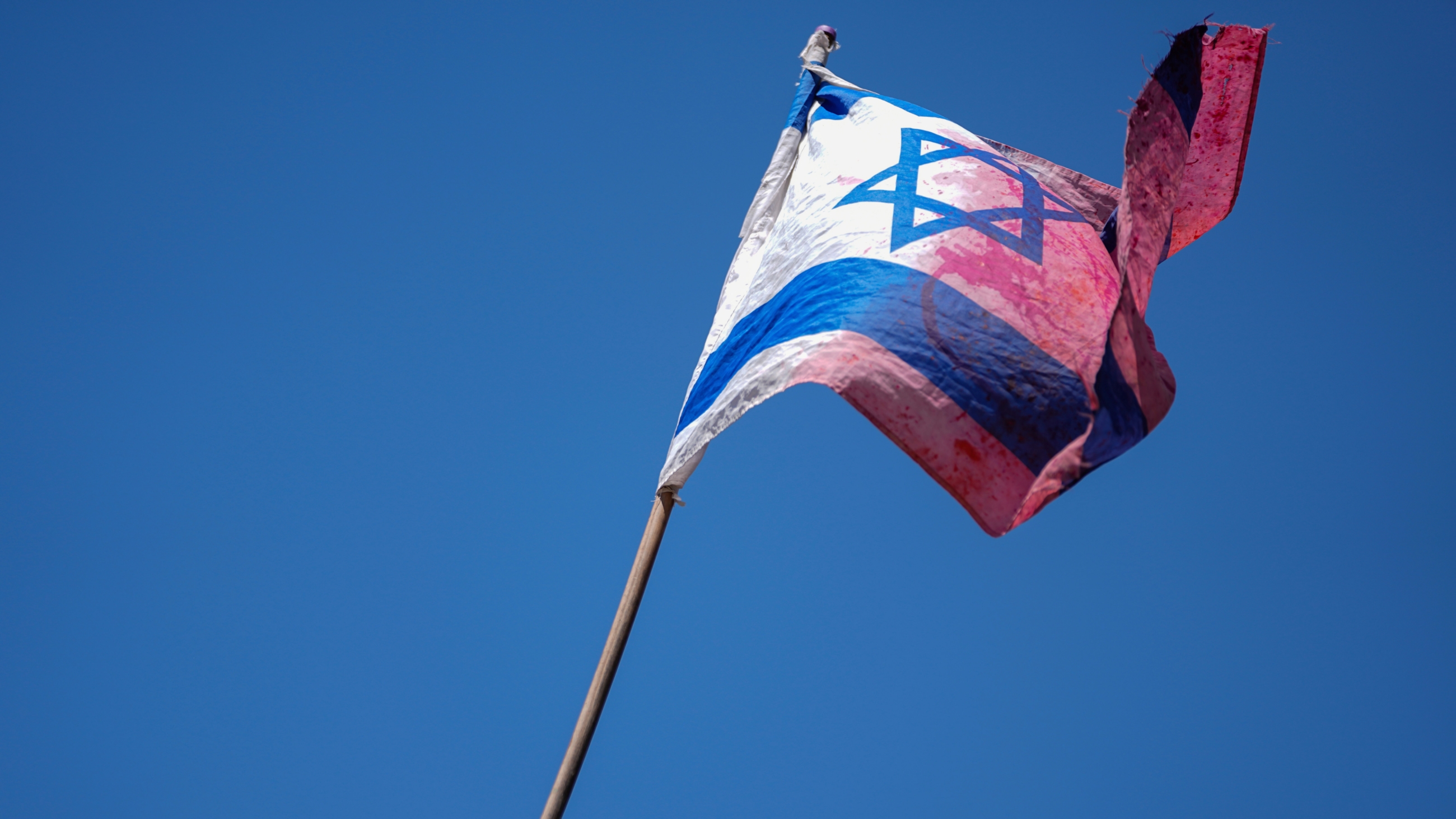
After the Israeli parliament passed a controversial law curbing the Supreme Court last week, the far-right Finance Minister Bezalel Smotrich said in a radio interview that the vote "was not really on the reasonableness standard, it was a vote on the refusal to serve in the army".
For months, protests had rocked the country over the government's judicial overhaul, with thousands of army reservists threatening to end their volunteer service if their demands were not met.
Unfazed, the ultranationalist governing coalition went ahead with a key bill in the overhaul anyway, revoking the court's ability to overrule government decisions using the "reasonableness standard".
The result from the military's point of view is an unprecedented crisis, represented by the thousands of reservists who are now quitting the service.
In an attempt to deny responsibility for the fallout from the vote, Smotrich - who also serves as a minister in the ministry of defence - is blaming those who are now being defined by some politicians as "traitors".
Smotrich, who himself only served a short 14-month term of the mandatory 34 months military service, said the country can't submit to the will of a "military junta" that wants to impose its ideology over a democratically voted government.
In a way, he is right. Only in a distorted reality could the army - the least democratic organ - assume the role of the saviour of democracy.
But Israel is distorted. And while an ultranationalist government is trying to change the country's core, many within the movement protesting the latest judicial reforms have seen elements within the army emerge as the protector of its institutions' independence; as a sword of Damocles hanging over the heads of the ruling coalition, which is planning to push through more judicial changes.
Like Smotrich, Prime Minister Benjamin Netanyahu appears dismissive of the refusal-to-serve threats. "The state can manage without a few squadrons, but cannot manage without a government," he said last month.
But many beg to differ, including the Israeli Military Intelligence unit, known as Aman.
In a series of four letters delivered to Netanyahu days before the vote on the cancellation of the reasonableness standard, the intelligence unit warned against immediate damage to Israeli deterrence against Iran and Hezbollah, and estimated that the likelihood of escalation is the highest it has been since the 2006 war in Lebanon.
The cracks from within the military are only one component driving this assessment.
Another crucial aspect is the relationship with the United States, which Aman believes will weaken in the long term if the judicial overhaul continues and the "common values" with Washington are eroded.
Those two factors, along with the deepening social schisms within Israel, build up to what many in Israel now consider an existential threat.
In an unusual urgent alert released last month, the Institute for National Security Studies (INSS) echoed these concerns.
"The model of the [Israeli army] as the 'people's army' is at risk of dissolution. We call urgently for an immediate cessation of unilateral legislation, and urge that changes be pursued through a broad consensus," the alert stated.
This is the second "strategic alert" released by INSS warning against the judicial overhaul, the first one issued just four months ago.
A twist in Israeli political norms follows.
The right-wing, historically linked with fear-mongering tactics to control a scared population, is now the soothing voice in Israel, working hard to cover up the mess they created, assure everyone the military is fine and blame the "left" for causing unnecessary panic for political gain.
'Heading towards a disaster'
But regardless of political games, the unprecedented crisis in the Israeli army is real and is growing by the day.
Thousands of soldiers from all military units - air force, navy, infantry, cyber, intelligence and other special units - have announced they will not show up for duty or training in the lead-up to the crucial vote last week. Many more joined them once the law passed.
Some numbers to reflect the situation: Before the parliament vote, 1,142 air force reserve personnel said they would stop reporting for duty if the government pushes through the legislation.
'The lack of around 250 combat pilots brings Israel to incompetence, it scares me'
- Israeli Major (Res.) I. B.
Among those air force reservists were 235 combat pilots, 98 transport plane pilots, 89 helicopter pilots and 173 drone operators.
Two days after the vote, 120 active reservists joined the group, bringing the number of pilots to 260.
Overall, at least 10,000 reservists - out of a total 490,000 - from 40 different units, who are active in the protests under the banner "brothers in arms", declared the suspension of their service after the vote.
"The lack of around 250 combat pilots brings Israel to incompetence, it scares me," said a major (reservist), who spoke to Middle East Eye on condition of anonymity, giving his name only as I. B.
"But I hold the government responsible for the situation," he added.
In private conversations, former commander of the Israeli air force, General (Res.) Eitan Ben Eliyahu, said: "We are heading towards a disaster".
The numbers, however, remain obscure, partly intentionally and partly due to complex definitions.
The military says most pilot reservists are in fact volunteers who for decades have chosen to show up for weekly training despite a dismissive tone from some politicians who view them as easily replaceable.
That's because the air force, more so than any other military unit, cannot operate with a high percentage of active pilots.
But it also cannot operate without the eyes of air-control units, which have seen many reservists suspend their service.
According to the military, the reservists are civilians and volunteers, and therefore cannot be defined legally as refusing to serve unless they publicly declare they won't report for duty after being called up.
But it's that same reason, that they are volunteers, which makes the military's ability to control them even more difficult.
"I totally understand the government does not want to cave in to a group of citizens with an advantage over them," a high-ranking air force veteran, now closely accompanying the pilots' protest, told MEE.
"On the other hand, this talk about replacing them with others is certainly not serious. It will take 15-20 years to get there."
What if Israel goes to war?
Perhaps the depth of the crisis will only be felt during Israel's next war.
In fact, some military analysts and many other Israelis fear that under these circumstances, the government will opt for some military action to prove that the competence of the army has not yet been compromised.
It will also be an opportunity to put to test those reservists who declared they will refuse to serve or who have suspended their training.
This scenario might come true relatively soon. Military experts estimate it takes about one to two months with no regular training for the army to lose its readiness to fight.
But the "situation within the air force is complicated", according to the air force veteran who spoke to MEE on condition of anonymity.
He said that some pilots have asked not to be summoned for training ever again, having made their final decisions.
Others requested not to be called in at least the near future, as they seek to distance themselves from the situation for the time being.
Meanwhile, the air force is trying to gather specific data on the scale of refusals and how they could affect each unit.
"They go into details like 'this unit has 40 reservists, 13 announced they don't show up for training'," the veteran told MEE.
He explained that every squadron has a designated person to stay in touch with the reservists, pilots and other crucial air force personnel.
The protesting reservists are now being called for personal meetings and discussions with their commanders to better understand where they stand, he added.
"No pressure put on them, but yes, an attempt to understand their limits," he said.
But what happens if Israel decides to launch a military operation, or is required to defend against attacks?
This is the dilemma that the protesting reservists share, whether they should go all the way with their threats or not.
"I know of some who will not show up in any case and others who will," the veteran said, asserting that some have "lost trust in decision-makers".
But he adds that the next steps in the reservists' protests have not been decided yet.
They are torn between the full implementation of the initial decision, convincing others to join them, and even holding an open gathering where their identities would be revealed to the public.
"The protest movement has reached a crossroads, and we are civilians within this movement."
No longer the 'people's army'?
This distinction between "military" and "civilians" in the veteran's comments are worth highlighting in this context.
For decades, Israel has prided itself on having a "people's army", a model that has defined universal military conscription since the founding of the state and continues to shape public perception of the armed forces.
In this model, reserve soldiers form the backbone of the military at times of great emergency, as the size of Israel's regular army remains relatively small.
But the cracks in the "people's army" model have been widening for a while, even before the current protest movement.
When four percent of discharged soldiers and officers are listed as reservists "in active service", the term "people's army" cannot apply.
It certainly is not valid when during the unprecedented political crisis, members of the governing coalition are pushing to make Torah study a core state value in a quasi-constitutional Basic Law.
If passed, it will further enshrine military exemption for members of the ultra-Orthodox community in Israel, who make up around 13 percent of the population.
With the current ultranationalist government continuing to alienate people with such policies and bills, the concept of a "people's army" will only get weaker, and reservists will be pushed further away.
This was the case with Major (Res.) Nir Avishai Cohen.
The 42-year-old deputy battalion commander used to serve as a reservist for 30-60 days, year after year.
Until 2010, he served in the occupied Palestinian territories while also being a leftist political activist.
'The sacred cow of military service had been slaughtered'
- Nir Avishai Cohen, former Israeli deputy battalion commander
He said he paid a price on the left for his commitment to the army, but the "moral and ideological" basis for his attitude has now crumbled under the current government.
"When Smotrich called to wipe out Huwwara [a Palestinian town in the occupied West Bank], [it meant] it might soon come as an order. So I quit, for good," he told MEE.
In March, he informed his commanders he would leave if the judicial overhaul materialised.
After the cancellation of the reasonableness standard bill, he made his final decision.
"It was the hardest thing I had to do in my life. I already notified my commander and my soldiers. There is no way back," he said.
"I also published it on social media and was shocked by the amount of support – including curses too, of course. But the situation is obvious: the sacred cow of military service had been slaughtered."
Perplexed leadership
So far, perplexed military leadership has been cautious in addressing the emerging phenomenon.
The defence minister, Yoav Gallant, who voted in favour of the controversial bill, decried the refusal threats while the army's chief of staff Herzi Halevi issued conciliatory statements like "reservists... are very dear to us".
Gallant reportedly believes the damage from the service refusal is so far "relatively limited" but could worsen in the future.
The military leadership most likely expects all of this to fade away peacefully or be put to the test with some security emergency.
But another invisible yet present cloud that hovers over the military is the fear of the International Criminal Court (ICC) if the judicial system is weakened.
Under an ineffective Israeli Supreme Court - which has provided legal protection to the army for decades - the ICC might feel it has the right to investigate Israeli soldiers, who have long been accused of possible war crimes.
Looking at it from a personal angle, soldiers might therefore feel abandoned by their own government, which has vowed that last week's divisive vote was only the "first step".
Middle East Eye propose une couverture et une analyse indépendantes et incomparables du Moyen-Orient, de l’Afrique du Nord et d’autres régions du monde. Pour en savoir plus sur la reprise de ce contenu et les frais qui s’appliquent, veuillez remplir ce formulaire [en anglais]. Pour en savoir plus sur MEE, cliquez ici [en anglais].


